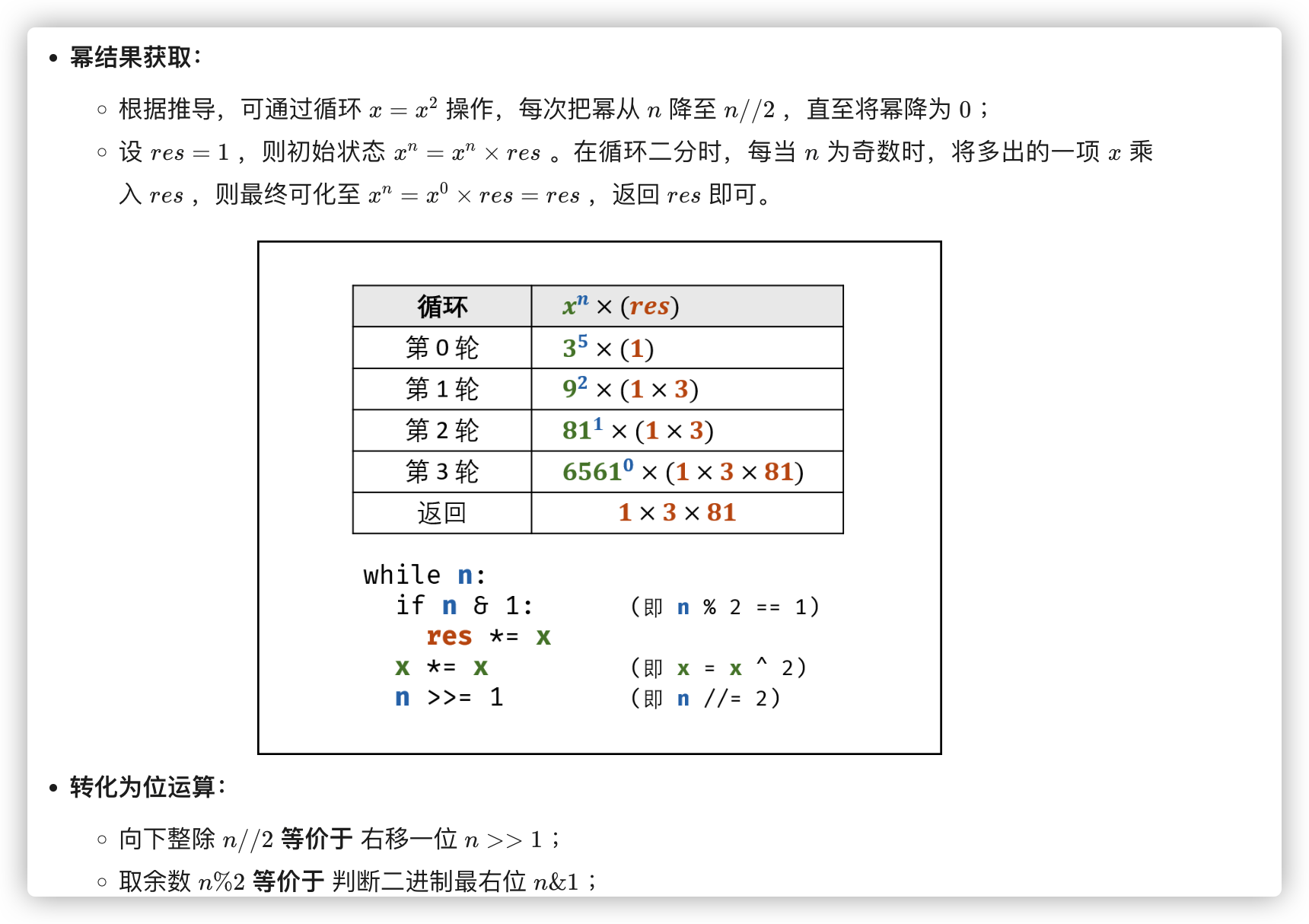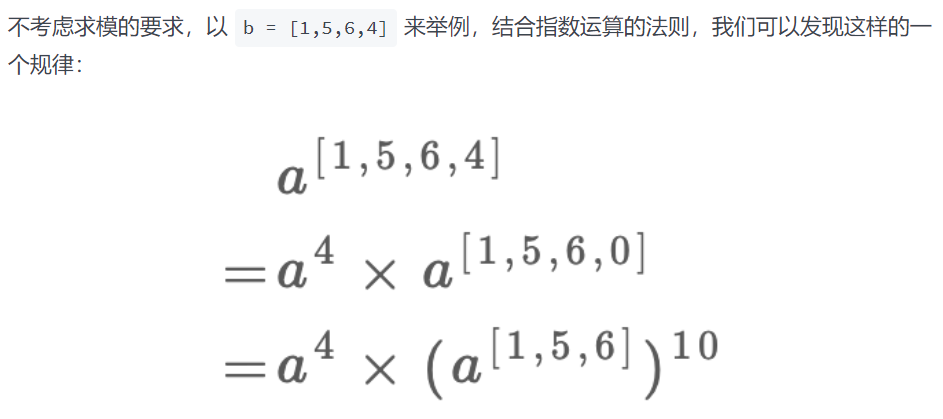labuladong如何高效进行模幂运算
372. 超级次方
先把问题分解为子问题
子问题1:如何高效求幂?
对应以下题目:
50. Pow(x, n)
- 通过x*x,每次x变为x^2;
- 通过n//2向下取整,n变为原来的一半;
- 当 n 为奇数时,将多出的一项 x 乘入 res


注意:在C++中,int32 变量 n∈[−2147483648,2147483647] ,因此当 n = -2147483648时执行 n = -n会因越界而赋值出错。解决方法是先将 n存入 long 变量 b ,后面用 b 操作即可。
写法1:用while循环并更新结果
class Solution {
public:
double myPow(double x, int n) {
// base case,直接返回0
if (x == 0.0) return 0.0;
// 如果是负数,则转换成正数
long b = n;
double res=1.0;
if (b < 0) {
x = 1 / x;
b = -b;
}
while (b > 0) {
// 如果b是奇数,则把当前x乘到res中,比如2^5=(2*2)^2 * (2*1,此时的1为result)
if (b % 2 == 1) {
res *= x;
}
x *= x; // 当前x变成x^2,
b >>= 1; // b右移一位,相当于除以2并向下取整
}
return res;
}
};class Solution(object):
def myPow(self, x, n):
"""
:type x: float
:type n: int
:rtype: float
"""
# 递归结束的条件
if n==0:return 1
# 处理n是负数的情况
if n<0:
x=1/x
n=-n
res=1
while n>0:
if n%2==1:
res*=x
x*=x
n=n>>1
return res
写法2:用递归(更容易理解)
- 根据上面的公式,若n为奇数,则在递归时另外乘以一个x,若n为偶数,则直接递归即可
- 为防止溢出,把int型的_n 转成long型
class Solution {
private:
double res = 0.0;
public:
double myPow(double x, int _n) {
// 把int _n 转成long,防止溢出
long n = _n;
// 递归结束的条件:n为0,除不动了。x的0次方为1,返回1
if (n == 0) return 1;
// 处理n为负数的情况
if (n < 0) {
x = 1 / x;
n = -n;
}
// 如果n为奇数,则递归时单独乘以一个x;若为偶数,则直接递归
res = (n % 2) ? x * myPow(x * x, n / 2 ): myPow(x * x, n / 2); // 整数默认都为地板除
return res;
}
};class Solution(object):
def myPow(self, x, n):
"""
:type x: float
:type n: int
:rtype: float
"""
# 递归结束的条件
if n==0:return 1
# 处理n是负数的情况
if n<0:
x=1/x
n=-n
res=1
if n%2==1:
res=self.myPow(x*x,n/2)*x
else:
res=self.myPow(x*x,n/2)
return res
子问题2:如何处理数组指数?

根据上述规律,可以发现,通过递归,可以缩小该问题规模
superPow(a, [1,5,6,4])
=> superPow(a, [1,5,6])因此,子问题2的递归可以写为(注:需要用到子问题1的实现):
int superPow(int a,vector<int>b){
// 递归结束的条件(base case)
if (b.empty()) return 1;
// 取出最后一个元素
int last=b.back;
b.pop_back();
// 缩小规模
int part1= myPow(a,b);
int part2= myPow(superPow(a,b),10);
return part1*part2;
}子问题3:如何处理mod运算?
在mod运算时,(a * b) % k = (a % k)(b % k) % k。也就是:对乘法的结果求模,等价于先对每个因子都求模,然后对因子相乘的结果再求模。
因此,在子问题1和2中,把各个因子(也就是幂运算的底)和有乘法的地方添加上mod运算即可。
- 根据题意,把子问题1各处的double类型的pow适当调整int,才能进行mod (比如说double和long等类型就不支持mod运算)
本题完整的代码为:
//#include <vector>
//#include <iostream>
//using namespace std;
class Solution {
private:
int res = 0.0;
int base = 1337;
public:
int myPow(int x, int n) {
// 把int _n 转成long,防止溢出
// long n = _n;
// 递归结束的条件:n为0,除不动了
if (n == 0) return 1;
// 处理n为负数的情况
if (n < 0) {
x = 1 / x;
n = -n;
}
x %= base;
// 如果n为奇数,则递归时单独乘以一个x;若为偶数,则直接递归
int b = n % 2;
res = (b == 1) ? (x * myPow(x * x, n / 2)) % base : myPow(x * x, n / 2);
return res;
}
int superPow(int a, vector<int> b) {
// 递归结束的条件(base case)
if (b.empty()) return 1;
// 取出最后一个元素
int last = b.back();
b.pop_back();
// 缩小规模
int part1 = myPow(a, last);
int part2 = myPow(superPow(a, b), 10);
return (part1 * part2) % base;
}
};
//int main() {
// int a = 2147483647;
// vector<int> b{2, 0, 0};
// Solution s;
// int ans = s.superPow(a, b);
// cout << ans << endl;
//}class Solution(object):
def __init__(self):
self.res=0
self.base=1337
def myPow(self, x, n):
# 快速幂,base case
if n==0:return 1
# 处理n是负数的情况
if n<0:
x=1/x
n=-n
x=x%self.base
res=1
while n>0:
if n%2==1:
res*=x
x*=x
n=n>>1
return res
def superPow(self, a, b):
if not b: return 1
last=b.pop()
part1=self.myPow(a,last)
part2=self.myPow(self.superPow(a,b),10)
return part1*part2%self.base
# a=2
# b=[3]
# so=Solution()
# print(so.superPow(a,b))
遗留问题:如果是递归计算快速幂myPow,则LeetCode可以通过,本地编译报错。WHY?
class Solution(object): def __init__(self): self.res=0 self.base=1337 def myPow(self, x, n):
# 递归结束的条件
if n==0:return 1
# 处理n是负数的情况
if n<0:
x=1/x
n=-n
x=x%self.base
return self.myPow(x*x,n/2) if n%2==0 else self.myPow(x*x,n/2)*x%self.base
def superPow(self, a, b):
if not b: return 1
last=b.pop()
part1=self.myPow(a,last)
part2=self.myPow(self.superPow(a,b),10)
return part1*part2%self.basea=2
b=[1,0]
so=Solution()
print(so.superPow(a,b))
```




